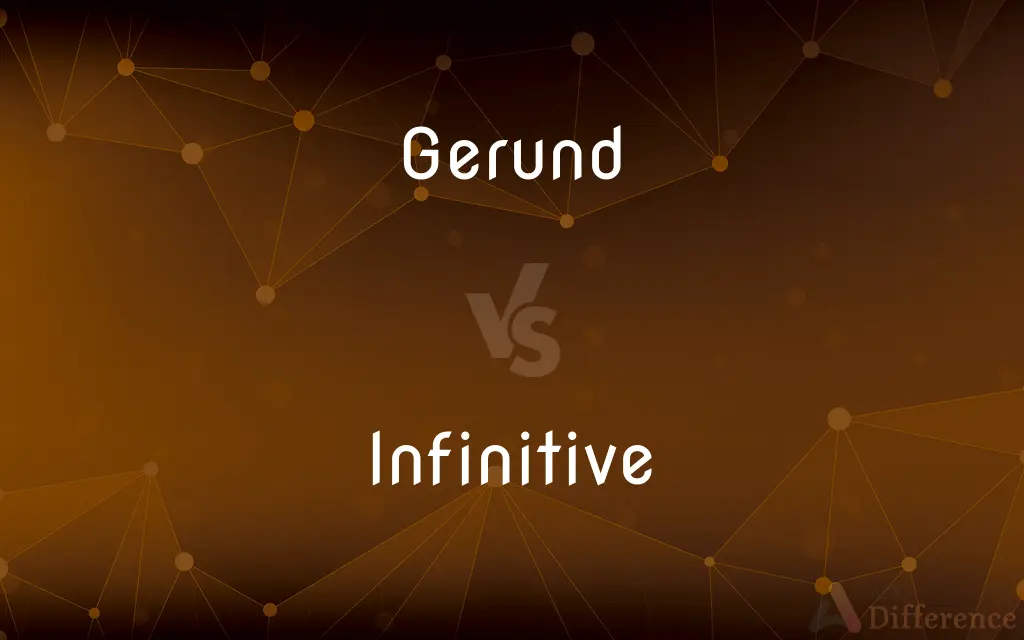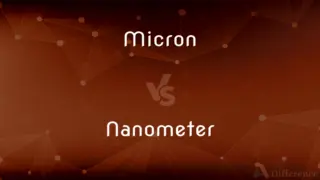Gerund vs. Infinitive — What's the Difference?

Difference Between Gerund and Infinitive
ADVERTISEMENT
Compare with Definitions
Gerund
A gerund ( abbreviated GER) is any of various nonfinite verb forms in various languages; most often, but not exclusively, one that functions as a noun. In English, it has the properties of both verb and noun, such as being modifiable by an adverb and being able to take a direct object.
Infinitive
Infinitive (abbreviated INF) is a linguistics term for certain verb forms existing in many languages, most often used as non-finite verbs. As with many linguistic concepts, there is not a single definition applicable to all languages.
Gerund
In Latin, a noun derived from a verb and having all case forms except the nominative.
Infinitive
A verb form that functions as a substantive while retaining certain verbal characteristics, such as modification by adverbs, and that in English may be preceded by to, as in To go willingly is to show strength or We want him to work harder, or may also occur without to, as in She had them read the letter or We may finish today. See Usage Note at split infinitive.
Gerund
In other languages, a verbal noun analogous to the Latin gerund, such as the English form ending in -ing when used as a noun, as in singing in We admired the choir's singing. See Usage Note at fused participle.
ADVERTISEMENT
Infinitive
(grammar) The infinitive mood or mode (a grammatical mood).
Gerund
(grammar) A verbal form that functions as a verbal noun. (In English, a gerund has the same spelling as a present participle, but functions differently; however, this distinction may be ambiguous or unclear and so is no longer made in some modern texts such as A Comprehensive Grammar of the English Language and The Cambridge Grammar of the English Language)
Infinitive
(grammar) A non-finite verb form considered neutral with respect to inflection; depending on language variously found used with auxiliary verbs, in subordinate clauses, or acting as a gerund, and often as the dictionary form.
Gerund
(grammar) In some languages such as Dutch, Italian or Russian, a verbal form similar to a present participle, but functioning as an adverb to form adverbial phrases or continuous tense. These constructions have various names besides gerund, depending on the language, such as conjunctive participles, active participles, adverbial participles, transgressives, etc.
Infinitive
(grammar) A verbal noun formed from the infinitive of a verb.
Gerund
A kind of verbal noun, having only the four oblique cases of the singular number, and governing cases like a participle.
Infinitive
(grammar) Formed with the infinitive.
Gerund
A verbal noun ending in -e, preceded by to and usually denoting purpose or end; - called also the dative infinitive; as, "Ic hæbbe mete tô etanne" (I have meat to eat.) In Modern English the name has been applied to verbal or participal nouns in -ing denoting a transitive action; e. g., by throwing a stone.
Infinitive
Unlimited; not bounded or restricted; undefined.
Gerund
A noun formed from a verb (such as the `-ing' form of an English verb when used as a noun)
Infinitive
Unlimited; not bounded or restricted; undefined.
Infinitive
An infinitive form of the verb; a verb in the infinitive mood; the infinitive mood.
Infinitive
In the manner of an infinitive mood.
Infinitive
The uninflected form of the verb
Infinitive
Formed with the infinitive;
An infinitive phrase
Infinitive
Not having inflections to indicate tense
Share Your Discovery

Previous Comparison
Micron vs. Nanometer
Next Comparison
Gun vs. Rifle













































